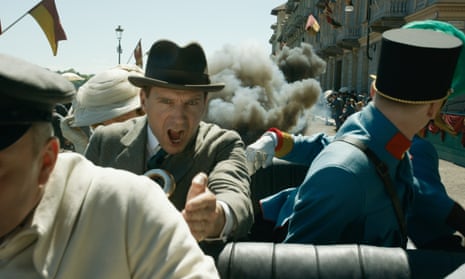Like a great big playful un-neutered pitbull, Matthew Vaughn’s new Kingsman movie comes crashing into our cinematic lives this Christmas, overturning the furniture and frantically humping everyone’s leg before rolling over on the carpet for you to tickle its tummy or anything else that comes to hand.
The third film in the OTT British spy romp franchise now gives us an epic origin myth, explaining how the Kingsman society came to be located in a posh tailor’s shop in London’s Savile Row, and how it was born in the first world war to battle a certain evil genius whom Vaughn cheerfully makes Scottish. This megalomaniac’s hidden hand is behind historical events you thought you knew all about – such as the assassination of Archduke Franz Ferdinand in 1914, the death of Lord Kitchener in 1916 and the Russian revolution in 1917. Bizarrely, the film also suggests that the famous poem Dulce et Decorum Est was actually written by the son of the Kingsman founder, without explaining how it came to be misattributed to a certain Wilfred Owen.
As before, Vaughn’s film-making has a crazy dad-humour energy, or weird-uncle energy, very startling and distinctive queer touches, such as Rasputin the Mad Monk licking Ralph Fiennes’s leg. Is this how Ronnie Kray would have directed a movie? There are spectacular set pieces and genuinely surprising twists: a fanatically maintained two-hour splurge of spectacular and artless bad taste with less of the smirking that made the first film unsupportable. This demands to be seen on the big screen but also on ITV4 on the small screen, with a tub of Quality Street on your Christmas-jumpered gut.
Fiennes plays the Duke of Oxford, who goes to South Africa as part of the Red Cross in 1902 during the Boer war to confront Kitchener (Charles Dance) over British military behaviour. He is with his wife Emily, played by the estimable Alexandra Maria Lara. But violence and tragedy are to scar his life and later make him overprotective of his headstrong, grownup son Conrad (Harris Dickinson). But, together with Oxford’s employees – and friends – Shola (Djimon Hounsou) and Polly (Gemma Arterton), he is forced to confront an international conspiracy with a Russian connection, involving the Mad Monk himself, played by Rhys Ifans. Vaughn shows uncharacteristic restraint in not using the classic Boney M song on the soundtrack. Aaron Taylor-Johnson plays Scottish soldier Archie Reid who is drawn into a fateful imposture and Tom Hollander gives an uproarious triple-decker performance, as the similar-looking cousins Tsar Nicholas, Kaiser Wilhelm and George V – a rather clever and acute casting idea.
The scenes in the trenches and no man’s land are shot with Vaughn’s reckless, tactless high spirits (as are his solemn anti-war effusions) and there is a specific case of suspected espionage and a certain point-blank gunshot that really will take you by surprise. There’s also, it should be said, a well-crafted bird’s-eye-view tableau sequence showing how the countryside of France morphed into the battlefields of the Great War. However little Vaughn wants you to take his film seriously, and however impossible that, of course, would be, in fact it is directed with great technical dash and ambition that many other British film-makers might well envy. There’s an appetite and a market out there for tongue-in-cheek spy extravaganzas, and this will probably run and run.

Comments (…)
Sign in or create your Guardian account to join the discussion